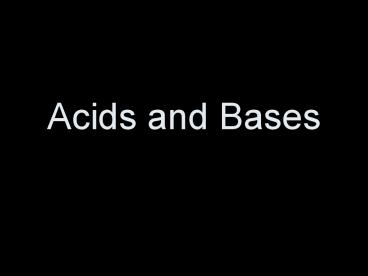Acids and Bases
1 / 31
Title: Acids and Bases
1
Acids and Bases
2
Drill 4/23/08
- Write everything you know about acids and bases!
3
Drill 4/30/08
- Write the equation for the neutralization
reaction between carbonic acid and calcium
hydroxide.
4
(No Transcript)
5
Properties of Acids (in aq solution)
- Sour taste
- Low pH
- Turn litmus paper red
- Conduct electrical current
6
Properties of Bases (in aq solution)
- Bitter taste
- Slippery
- High pH
- Turn litmus paper blue
- Conduct electrical current
7
Arrhenius Definition
- Acid substance that releases H ions in aq
solution - HCl ? H Cl-
- Base substance that releases OH- ions in aq
solution - NaOH ? Na OH-
8
Bronsted-Lowry Definition
- As more and more substances were determined to
have acidic or basic properties, even some
without obvious H or OH-, a new definition was
needed. - Acid proton donor
- Base proton acceptor
9
Bronsted-Lowry Definition
- Acid proton donor
- H2O HCl ? H3O1 Cl-1
10
Bronsted-Lowry Definition
- Base proton acceptor
- NH3 H2O ? NH4 OH
11
Acid-Base Reactions
- Known as a neutralization reaction. Acids and
bases will react with each other to form water
and salt. - HCl NaOH ? H2O NaCl
12
Day 2
13
Acid Naming Overview
- Binary
- Start with hydro-
- Element
- End with ic acid
- Tertiary
- I ate something, and now I am sick
- If anion ends in ate then the acid ends in ic
- If the anion ends in ite then the acid ends in
-ous
14
Acids Bases Review
- Acid
- substance that releases H ions in aq solution
- Proton donor
- Electron pair acceptor
- Base
- substance that releases OH- ions in aq solution
- Proton acceptor
- Electron pair donator
15
Acid Strength
- A stronger acid will transfer MORE protons (H)
than a weak acid. It will create more hydronium
ions (H30) in water. - Hydrochloric acid
- HCl H20 ? H30 Cl-
- Acetic Acid
- CH3COOH H20 ? H30 CH3COO-
More dissociation!
Less dissociation!
16
- How do we compare the strength of an acid or a
base? - We measure the amount of hydronium ions they
create (acids) or the amount of hydroxide ions
they create (bases).using concentration.
17
What is concentration?
- Using molarity, it is a measure of moles of
solute in liters of solution. - Concentration is measured in WATER!
18
H2O is both an acid and a base
- Water is simultaneously donating and accepting
protons!
19
What are the ion concentrations in water?
- The concentrations of H3O and OH- in pure water
are each 1.0x10-7 mol/L at 25ºC. - Putting a symbol in brackets is used to signify
the concentration. - H30 1.0x10-7 M
- OH- 1.0x10-7 M
20
Ionization Constant of water, KW
- KW H30 OH-
- KW (1.0x10-7)(1.0x10-7) 1.0x10-14
21
- Acids increase the H30 Whenever H30 is
greater than OH-, the solution is acidic. - Bases increase the OH-
- Whenever OH- is greater than H30, the
solution is basic.
With an increase in H30, some of the H30
ions will react with the OH- ions, reducing OH-
. H30OH- will still 1.0x10-14
22
- Concentration values tend to be smallso we use a
more convenient scale. pH!
23
(No Transcript)
24
pH pOH 14
- pH A measure of the acidity of a solution. It
is the negative logarithm of the hydronium ion
H30 concentration. - pH -log H30
25
pH pOH 14
- pOH A measure of how basic a solution is. It
is the negative logarithm of the hydroxide OH-
concentration. - pOH -log OH-
26
- The logarithm base 10 of a number x is the power
to which 10 must be raised in order to equal x. - Log 10 x ? Log 100 ?
- 10? x 10 ? 100
27
- Remember, our concentrations are SMALL. So we
are going to be dealing with decimals - Log 10 x ? Log .001 ?
- 10? x 10 ? .001
28
H 1.00 x 10-3 0.001 pH -log H pH
-log (1.00 x 10-3) pH 3
To determine pH from a concentration where 1 is
the only digit, write the concentration in
scientific notation. The exponent will be the pH.
29
- For a base, you do the same thing except remember
that you are solving for pOH first
30
(No Transcript)
31
(No Transcript)































